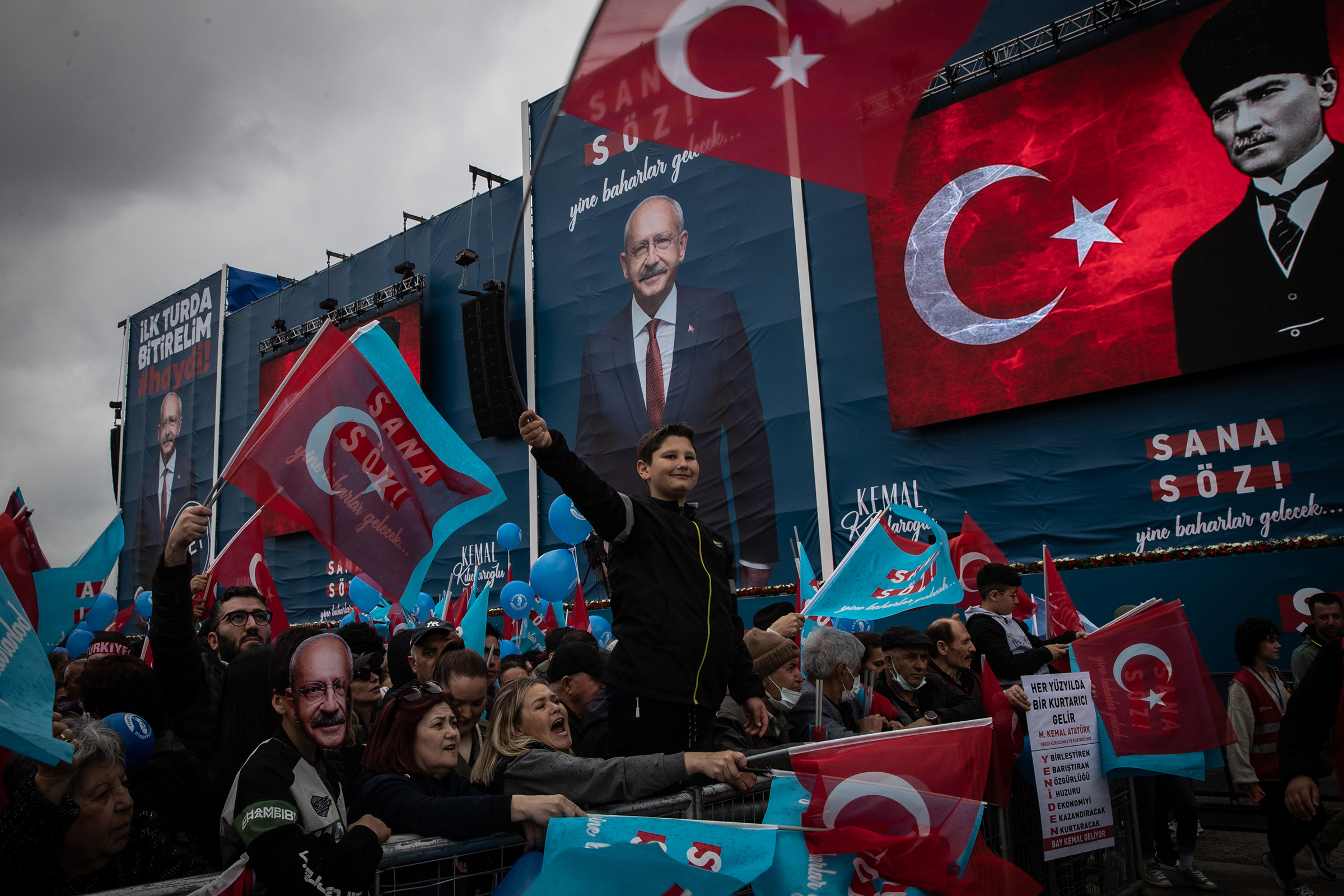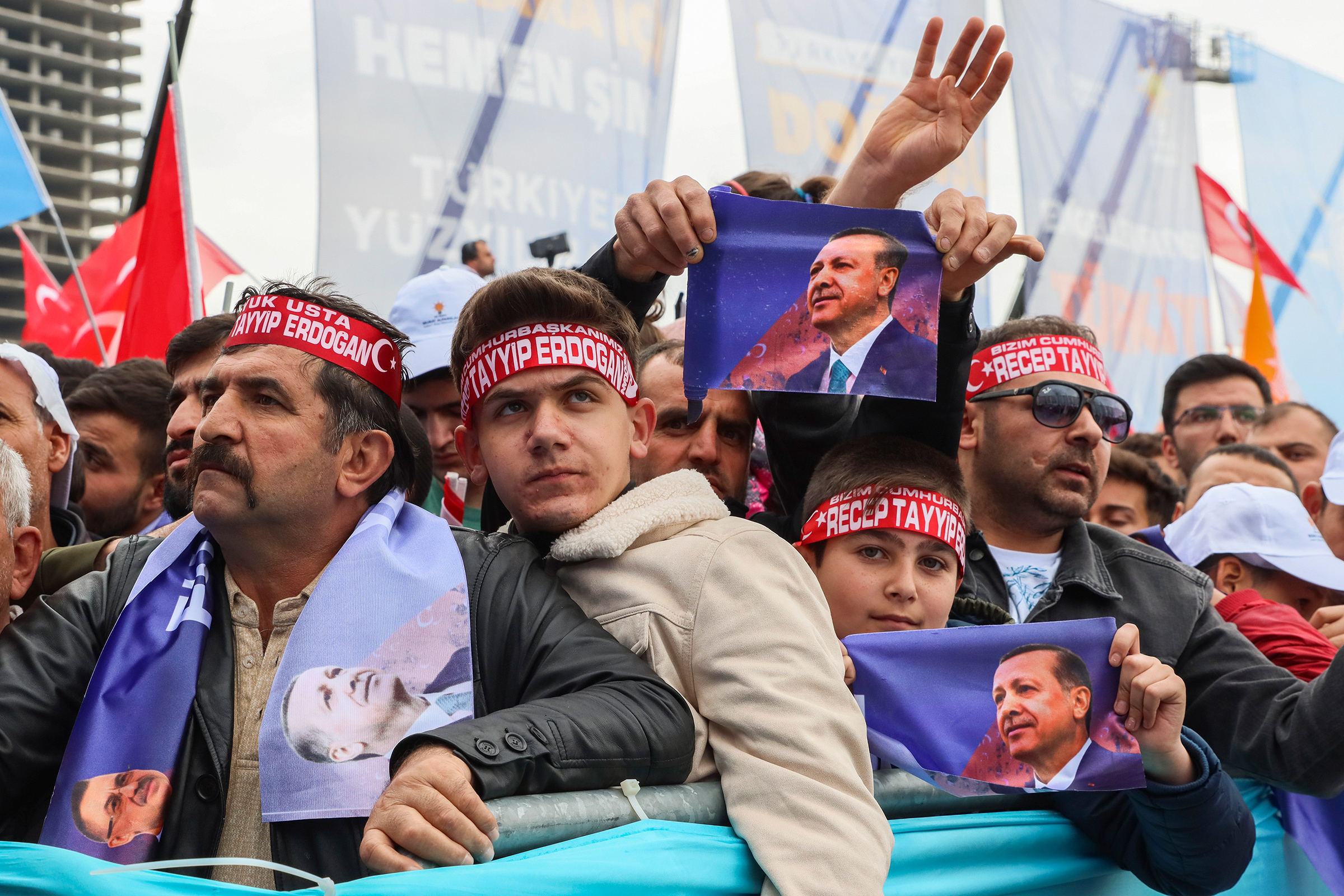
On Sunday, Turkish voters face a stark choice between two front-runners offering drastically different visions for the country in an election that has grave implications not just for the future of Turkish democracy, but some of the most pressing global issues today.
As the Turkish republic marks its centenary this year, President Recep Tayyip Erdoğan, who has clung to power for an unprecedented 21 years, faces the challenge of convincing voters to cast his name at the ballot box yet again despite growing public anger over a cost of living crisis and the devastation of twin earthquakes in February that killed at least 50,000 people—and displaced another 3 million.
Erdoğan’s main challenger is Kemal Kılıçdaroğlu, the leading opposition candidate who has maintained a narrow lead in the polls and is campaigning on a pledge to reverse a years-long slide into authoritarianism and bring back the rule of law.
More from TIME
Below, what to know about the high-stakes May 14 vote.
Who is President Recep Tayyip Erdoğan?
Erdoğan came to power over two decades ago on the promise of competent governance. The 69-year-old politician belongs to the conservative and Islamist Justice and Development Party, or AKP. He is the country’s longest-serving leader to date.
Erdoğan was first elected Prime Minister in 2003, then the country’s top job, and held the post until 2014, when he became President. In 2016, a failed coup to overthrow him saw Erdoğan respond with a constitutional referendum that turned Turkey from a parliamentary system to a presidential one and scrapped the post of Prime Minister. He now runs Turkey as the country’s President from a vast palace in Ankara.

Read More: Exclusive: TIME Meets Turkish Prime Minister Recep Tayyip Erdogan
Over his terms as Prime Minister and President, Erdoğan has been a highly divisive authoritarian figure with a religious nationalist bent.
The aftermath of the failed coup—for which Erdoğan blames Fethullah Gulen, a Turkish cleric and businessman living in self-imposed exile in the U.S.—has seen Turkey increasingly crack down on any form of dissent. Turkey was downgraded from “partly free” to “not free” in 2016 by Freedom House, a ranking that has not budged since.
In the lead-up to Sunday’s vote, Erdoğan has announced a series of economic benefits for voters, including free gas and mobile data. He has also attended ribbon-cutting ceremonies for Turkey’s first aircraft carrier and its first nuclear power plant, built by Russia.
Erdoğan has also pursued unorthodox monetary policies by slashing interest rates to counter inflation, which most economists advise against. Inflation at one point in Turkey last year hit a staggering 85% under what international observers have dubbed “Erdogonamics.”
Who is Kemal Kılıçdaroğlu?
Kemal Kılıçdaroğlu is the leader of the secular, center-left Republican People’s Party, or CHP. Nicknamed “Gandhi Kemal” by Turkish media, Kılıçdaroğlu has received political backing from the opposition, with six parties, including the country’s pro-Kurdish party that has won more than 10% of the votes in past national elections, banding together under the National Alliance to support him.
In contrast to Erdoğan, the 74-year-old Kılıçdaroğlu is a soft-spoken politician credited with uniting a fractured opposition that wants to dismantle the executive presidential system installed by Erdoğan and return to a parliamentary system.
“This is an election for those defending democracy against authoritarian rule,” he told TIME in an exclusive interview in April.
Read More: Exclusive: The Man Who Could Beat Erdoğan
The opposition leader has also promised to reform Turkey’s financial institutions and lure back foreign investors by repairing relations with Europe. In his election campaign, Kılıçdaroğlu has repeatedly pointed out how runaway inflation has hurt households—including a popular video on Twitter where he held up an onion, a vital ingredient of Turkish kitchens, to talk about how food prices have increased fivefold over the past 18 months.

How closely contested is Turkey’s election expected to be?
Under Turkey’s electoral rules, the winning presidential candidate must receive more than 50% of the ballots in the first round. Political analysts expect that in this election, no candidate is likely to get the majority vote, which would mean that the presidential contest would go to a second round on May 28.
Parliamentary elections for the 600-seat legislature also take place at the same time as the presidential elections. In the parliamentary vote, polls suggest that Erdogan’s AKP comes ahead with 44% over the main opposition alliance at 39.9%, according to the latest survey by pollster Konda.
With Kılıçdaroğlu holding a narrow lead over Erdoğan, many question whether the current President would accept electoral defeat. When an Erdoğan-backed candidate narrowly lost Istanbul’s mayoral election in 2019 to Ekrem Imamoğlu, the President used the judiciary to order a rerun, which Imamoğlu then won in a landslide.
In the lead-up to this year’s general election, Kılıçdaroğlu and allies have faced some violence from Erdoğan supporters. Over the weekend, more than a dozen people were detained after pelting stones at an opposition election rally in Turkey’s eastern city of Erzurum. During an interview with KRT television last Thursday, Kılıçdaroğlu warned his supporters to stay home after the polls close on election night. “Some people might stir trouble, some people may be provoked, armed elements may take the streets,” he said. But political experts nevertheless expect Turkish democracy to be robust enough to ensure a fair and free election on Sunday.
There are also concerns over how Turkish voters who were displaced by the earthquakes will vote. Officials say only 133,000 of the 3 million people who left their hometowns following the devastation have registered to vote at their new locations.
Read More: How Erdoğan’s Obsession With Power Got in the Way of Turkey’s Earthquake Response
What’s at stake?
An opposition victory could have significant consequences on the country’s democracy, economics, and foreign policy.
Turkey is currently walking a tightrope between NATO, Russia, and Ukraine by aligning with Russia while also providing military support to Ukraine, with Erdoğan positioning himself as an intermediary. Kılıçdaroğlu’s win might see the NATO member come closer to a Western-led consensus on the war by patching up ties with traditional E.U. allies.
On a global scale, experts argue Erdoğan’s win or loss could also impact the future trajectory of democratic expansion. The Turkish leader paved the way for electoral autocracy built on “majoritarian grandstanding, divisive culture wars, anti-Western grievance and paranoia about domestic and foreign plots — not to mention the capture of key state institutions, the intimidation and arrest of dissenters and civil society members, and the steady erosion of the country’s free press,” argued Ishaan Tharoor in the Washington Post.
In recent years, countries from Hungary to India have followed in Erdoğan’s footsteps by chipping away at democratic institutions. Fifty-six countries now qualify as “electoral autocracies,” up from 40 near the end of the Cold War, according to the research institute v-Dem.
But if Erdoğan loses, “it will show that the erosion of democracy can be reversed—and suggest how,” the Economist recently argued.
More Must-Reads From TIME
- The 100 Most Influential People of 2024
- The Revolution of Yulia Navalnaya
- 6 Compliments That Land Every Time
- Stop Looking for Your Forever Home
- If You're Dating Right Now , You're Brave: Column
- The AI That Could Heal a Divided Internet
- Fallout Is a Brilliant Model for the Future of Video Game Adaptations
- Want Weekly Recs on What to Watch, Read, and More? Sign Up for Worth Your Time
Write to Astha Rajvanshi at astha.rajvanshi@time.com